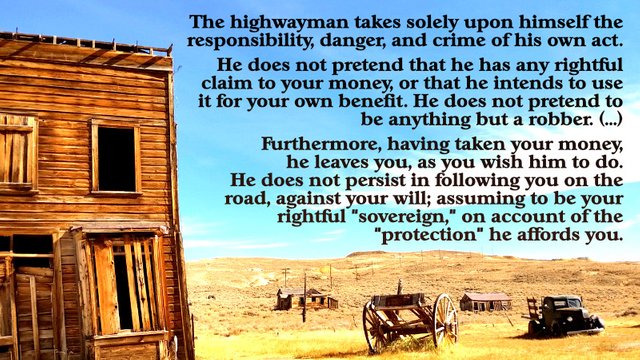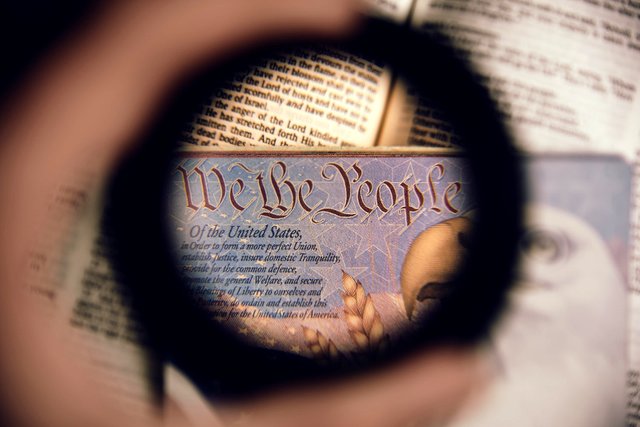Constitutions are hailed as timeless documents for the securement of freedom, prosperity and liberty in many countries on Earth. For most people living in the United States this seems especially significant, as the US constitution is widely regarded as the modern international prototype of a basic legal framework that is supposed to protect the rights of the individual against arbitrary legislation, theft and the curtailing of expression, among other encroachments.
But as with so many things in our world, it might be beneficial for our understanding to take a deeper look at what has been proposed in this famous document on a fundamental level before we call upon its "protection".
In this miniseries we will explore the questionable foundations of the document and its basic reasoning that is often overlooked in debates about the merit of amendments, legality and application. If we really want to get a better understanding of this social contract, we have to start with the basic notion of its validity. A question that might come as an utter surprise to those who firmly believe that the Constitution is the greatest guarantee for the securement of freedom humanity has ever managed to achieve...

A matter of logic
As a lifelong fan of using my logical mind to discern the merit of any idea I come across these days I am happy to tell you that using our rational mind is quite enough already to cast doubt on the seemingly unanimous consent for the validity of the document and others like it.
This article is not meant to deride the US Constitution in particular - rather it is meant as an exercise to uncover the core notion of how such a document could ever hope to be a binding agreement on those who never voluntarily consented to its validity - in any country. The same train of thought from this example can and should be applied to any such document that is alleged to be the cornerstone of any "civilized society".

The fine print is in the idea, not in the print
If we started with the merits of each sentence and wording, we would have already taken one step too far. Before we get into the validity of any of the proposals outlined in the constitution we may want to take the stance of a child, asking simple and "stupid" questions that nobody seems to ask anymore these days.
Some of these questions hint at a legal framework that is known by some as "natural law" which we will explore further in the future.
Such questions would go something like this:
- What gives you the right to decide over my life when I did not agree to be decided over?
- How can any agreement I have never voluntarily consented to be binding upon me?
- In what way was it assumed that I consented if the document is supposed to secure my liberty of self-determination?
- How can any contract be binding for eternity when I have not stated my expressed support for said document?
There are many other questions like this worth asking.
Granted, these questions would go beyond the scope of the smartest kids out there, but you get the idea. If we did not ask these and jumped right into the nitty gritty of the text, we would miss very significant considerations that might cast a completely different light on such a broad social contract that is supposedly binding upon everybody by default.
But is it really?

An unsung hero
In the spirit of a fundamental analysis of the assumptions our culture tends to make about our alleged legal frameworks, it is my pleasure to introduce you to Lysander Spooner - a man most people will have never heard of.
Mr. Spooner was a lawyer, anarchist and political philosopher in the early 19th century that was an outspoken critic of the Constitution. And long before the modern discussions about the merits of certain articles and amendments emerged, there was already ample reason to contemplate the implications of making such a document binding upon everybody - as he brilliantly lays out for us to consider, today - a good 150 years later.
His marvellous essay "No Treason - The Constitution Of No Authority" has been made publicly available in recent years as an audiobook, and though it may not be the easiest text to digest it most certainly is worth your consideration and time. Some would argue it to be the most important thing to learn about when growing up in Western societies.
Whether you are an advocate of the Constitution or not, the points Spooner brings up in his intelligent essay are almost unheard of within the alternative media today (with a few rare exceptions) and we find that we already assume so much about a lawful society that might turn out to be the complete opposite of what we actually wanted.
The essay is about two hours long, and I can strongly recommend listening to it multiple times to grasp the full ramifications. And then make up your own mind - as always <3
If you prefer the written word as opposed to the audiobook you can find the full essay here
unsplash.com
unsplash.com
unsplash.com
Thanks for stopping by <3